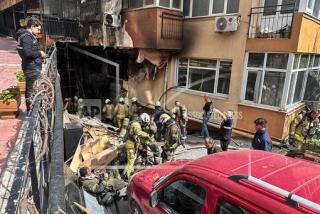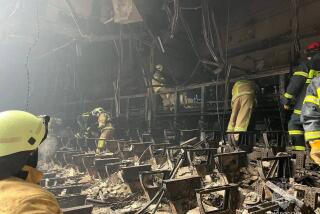What we know about the Kurdish group that claimed responsibility for the deadly bombing in Istanbul
A group called the Kurdistan Freedom Falcons, also known by its Turkish acronym TAK, claimed responsibility for the bombing of a football stadium in Istanbul on Saturday that killed 44 people.
A car carrying about 900 pounds of explosives detonated near police officers guarding the stadium shortly after a football match had ended. A suicide bomber killed four more officers in a nearby park less than a minute later. Eight civilians also died in the attack.
It was the 14th bombing carried out by TAK, which was designated a terrorist organization by the U.S. in 2008.
What was the motive for the attack?
TAK said in a statement that the attack was carried out by two members of its “Martyr Revenge Team.” The group said the Turkish people “should not expect life to be normal” as long as Kurdish leader Abdullah Ocalan remains in prison and Ankara continues to fight Kurdistan Workers Party militants in the majority Kurdish southeast. It blamed the ruling Justice and Development Party, or AKP, for the current cycle of violence in the country, saying, “The people of Turkey must put a stop to this fascism. The AKP’s fascism is solely responsible for this.”
Who is Ocalan?
TAK is an offshoot of the Kurdistan Workers Party, or PKK, a group also designated as a terrorist organization by Turkey, the European Union and the United States.
Ocalan, a former political science student who was influenced by American and European leftist thinkers, founded the PKK in 1978. Seeking to establish a local, autonomous governance system for the country’s Kurdish minority, which had long faced discrimination, the PKK took up arms in 1984.
By 1999, when Ocalan was captured by Turkish intelligence agents in Kenya, the insurgency had killed about 30,000 people, and thousands of Kurdish villages had been leveled by the Turkish military in what human rights groups say amounted to a scorched-earth campaign.
Ocalan was brought to a prison island near Istanbul and sentenced to death for treason and separatism, although the sentence was later commuted to life in prison after Turkey abolished the death penalty.
Ocalan is a fixture for many of the 30 million Kurds living in Turkey, Iraq, Syria, and Iran, and he is named as the honorary head of dozens of pro-Kurdish organizations in the region, including the Democratic Union Party, which controls large parts of northern Syria.
Where did TAK come from?
By 2004, the ruling Justice and Development Party had opened negotiations with the PKK through Ocalan, who had begun calling for the militants to leave behind armed struggle, but a large and increasingly vocal set of young recruits from urban areas of Turkey split from the organization, forming TAK.
“We fought against the enemy from inside the PKK for a period of time,” TAK said in its founding statement. “We found that the political struggle methods of the [PKK] are weak and produce no viable outcomes.”
At least 155 people, mostly police but also civilians, have been killed by TAK suicide bombers and car bombs in Istanbul, Ankara, and other urban areas of the country since the group’s first attack in 2005, which targeted a minibus carrying tourists in the Aegean resort district of Aydin.
How is TAK related to other Kurdish groups?
The PKK has denied it controls TAK, but its leadership has stopped short of condemning the group’s attacks. Cemil Bayik, a co-founder of the PKK who now serves as one of the group’s top military commanders, told the BBC in an April interview that his organization “had nothing to do” with TAK. When asked about the civilian casualties caused by TAK, Bayik cited reports of Turkish forces targeting civilians and said “if TAK takes action under these conditions, people will be sympathetic.”
In contrast with those of the PKK, TAK’s attacks, usually employing a suicide bomber, have mostly taken place in densely populated urban areas in western Turkey, and its targets have tended to be police instead of soldiers — but the powerful explosives it often employs have injured civilians as well.
Many of TAK’s bombings have followed periods of intensified fighting between Turkish security forces and PKK militants in the southeast. This has led analysts to believe the PKK has had a hand in training and equipping TAK members, but TAK draws up its own list of targets and decides when to carry out attacks in response to developments in the war between Ankara and the PKK. “The TAK campaign in western Turkey is an attempt by the PKK to relieve pressure from a heavy-handed, counterinsurgent campaign by the Turkish military in southeastern Turkey,” according to an assessment by the Combating Terrorism Center at West Point, “and undermine [President Recep Tayyip Erdogan’s] government while maintaining an element of plausible deniability.”
Despite the denial by the PKK that it has control over TAK, there are indications the groups maintain a close relationship, and the Turkish government sees the two as the same organization. After each suicide attack, TAK has released a biography of its operatives. All have been Turkish nationals younger than 30, and most have spent time as PKK militants in Syria or Iraq.
Abdulbaki Somer, a suicide bomber who killed 29 people in a Feb. 17 attack in Ankara, spent 10 years with the PKK in Turkey and northern Iraq, followed by a year and a half in northern Syria, presumably in Democratic Union Party areas along the border. Somer, according to Turkish officials, returned to Turkey in 2015 claiming to be a Syrian refugee. Cagla Demir, a female suicide bomber TAK said was behind a March 2016 attack in Ankara that killed 37, and Eser Cali, a female bomber who carried out an April 2016 attack in Bursa that injured 13, spent six months in Syria.
TAK’s relationship with the PKK and both groups’ relationship with Kurdish groups such as the Democratic Union Party in northern Syria have been a source of tension between Turkey and its NATO allies. Ankara accuses European governments of turning a blind eye while the PKK enjoys a financial and political haven in Europe. At the same time, the European Union has cited Turkey’s disproportionate use of counter-terrorism laws as a reason for delaying its membership in the union. The United States, meanwhile, relies on the Democratic Union Party and other Kurdish groups in Syria with links to the PKK for its fight against Islamic State.
Farooq is a special correspondent.
ALSO
Bombings targeting police kill 38 people and injure 155 near Istanbul soccer stadium
Eight leaders of pro-Kurdish party arrested amid growing tension in Turkey
Civilians are trapped and the dead lie unburied as fighting rages in Turkey’s Kurdish heartland
More to Read
Start your day right
Sign up for Essential California for news, features and recommendations from the L.A. Times and beyond in your inbox six days a week.
You may occasionally receive promotional content from the Los Angeles Times.






